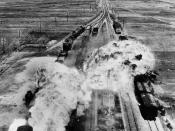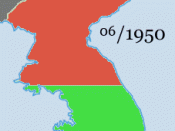Korean War
Notes
At 4:00 a.m. Sunday morning, 25 June 1950, North Korea crossed the
38th Parallel (known as the "Line of Demarcation" in that part of the world), and launched a full-scale invasion of South Korea. The UN Security Council immediately passed a resolution calling on the "Democratic People's Republic of Korea" (the DPRK) to cease hostilities and to withdraw.
When the North Koreans refused, the Security Council passed a second resolution on the 27th of June, recommending that UN members "furnish such assistance to the Republic of Korea [South Korea] as may be necessary to repel the armed attack and restore the international peace and security in the area." Meanwhile, DPRK's southern-moving forces were advancing rapidly. Seoul, South Korea's capital, fell in four days.
These events posed a major challenge to the Truman Administration and to America's allies. If the invasion were not checked, it would set a precedent that could easily undermine the confidence of post-WWII countries relying on the U.S.
for protection. Countries like South Korea. How was it that a nation, politically unified for two millennia, was now fighting itself?
Japan had annexed Korea in 1910 and ruled it until the end of WWII. When Japan lost the war, Korea (like Germany) would be divided into two areas. The Soviet Union, and its allies, would operate in the North while the US, and its allies, would operate in the South.
North Korea, meanwhile, formed its own government: The Democratic People's Republic of Korea. Kim Il Sung was its leader and his government claimed jurisdiction over the entire Korean Peninsula (including the South).
In November of 1948, South Korea created a national department of defense. By June of 1950, the new republic in the south had a very small operational defense force:In June...


